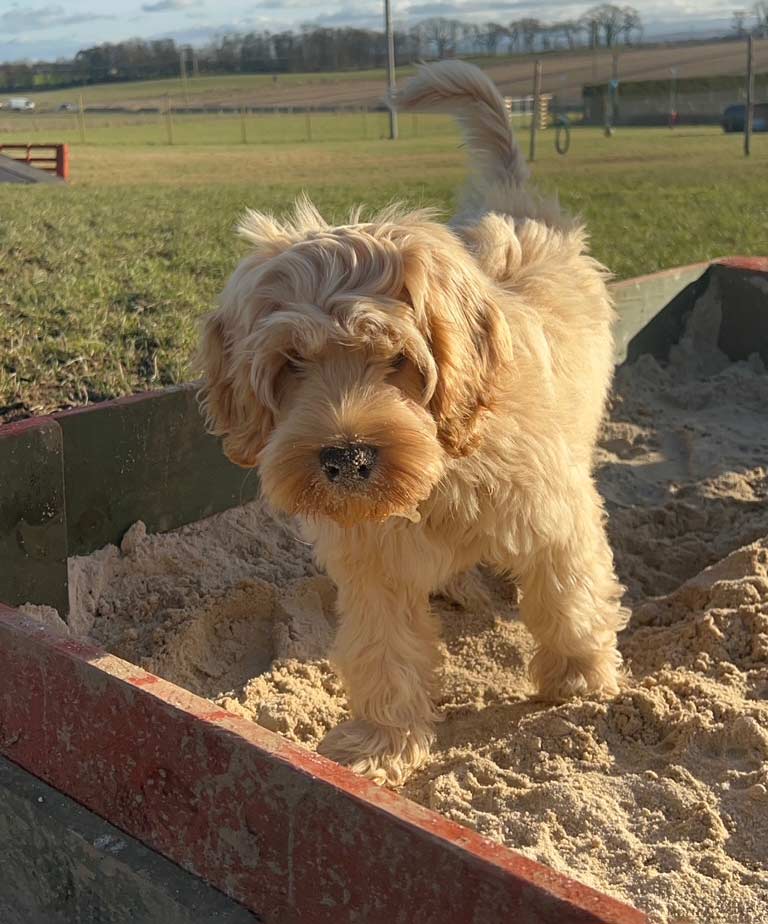The Australian Cobberdog is a ‘breed in development’ which means every breeder looks for consistency in the puppies they breed to meet the ‘breed standard’. Selective breeding programs will see more and more Cobberdog puppies reaching this standard. It is however a moving feast, with advances in DNA the genes for more diseases are being identified or implicated and so it is vital that testing of breeding dogs keeps pace.
We genetically test all our dogs and any pup that we want to use for the next generation has to be the very best.
There at least 4 labs where you can get your dog’s DNA tested – Orivet which most Cobberdog breeders use, Pawprint which many used to use, Embark which is becoming more and more common and myDogDNA (aka Wisdom Panel) which until recently used to do their testing here in Scotland. All 4 have labs in US (and elsewhere).
We have tried them all, not because we had any doubts but because, living in Scotland when the labs are in the US, we wanted to be sure of the time each one takes to receive, test and issue the results. Pups are typically tested at 2 weeks so a long turnaround time could delay the pups leaving at the planned time leaving some very disappointed owners! The time taken varied by several weeks. Our Mojo must be the most DNA tested Cobberdog ever as his DNA has been tested at all 4 labs!
Our preferred lab is Orivet, which just happens to be the one of choice for many Cobberdog breeders. Orivet is a leading global genetic testing organisation that has developed internationally recognised protocols and programmes. Orivet states on their website: “Orivet’s Full Breed Profiles (FBPs) are breed specific genetic screens for diseases & traits that are relevant to each breed. Our customised panels select from over 280 genetic tests that have been scientifically validated (published) for the breed listed.” The Orivet Full Breed Profile for the Australian Cobberdog genetic testing is given below.

Hip dysplasia is a problem where the hip socket doesn’t fully cover the ball part of the joint. This creates a poor fit in the hip joint and makes it more vulnerable to stress and damage. These changes accelerate wear and tear on the joint, which eventually leads to painful osteoarthritis. Hip scores report on the status of the joints and the potential risk of joint problems, including Congenital Hip Dysplasia (CDH).
At Three Bridges we use the BVA hip scoring programme as recommended by our vet. X-rays taken by our vet are sent to the BVA/KC Hip Dysplasia specialists and we receive the assessment. Hips are scored on a scale of 0 to 106, the lower the score the better. A score of 18 and below is generally regarded as acceptable for breeding purposes, dogs that don’t meet the criteria are not used in the breeding program.
Owners have a very real influence over their dog’s hip and elbow welfare. A puppy’s skeletal growth is not complete until around 18-24 months so it is very important you learn how to take care and protect your puppy’s joints as they grow and develop.
Some sound advice includes:
Remember, as a responsible dog owner, it is your responsibility to protect and care for your puppy’s joints as they develop. If you do so, then your puppy should grow to adulthood without hip problems.
Lots of the information on this website has been taken from the Tegan’s Australian Cobberdog website with permission. We are proud to be part of the Tegan’s Australian Cobberdog community and to have Mellodie, the co-founder, as our breeding mentor.
For more details on this amazing breed please visit www.tegancobberdogs.com